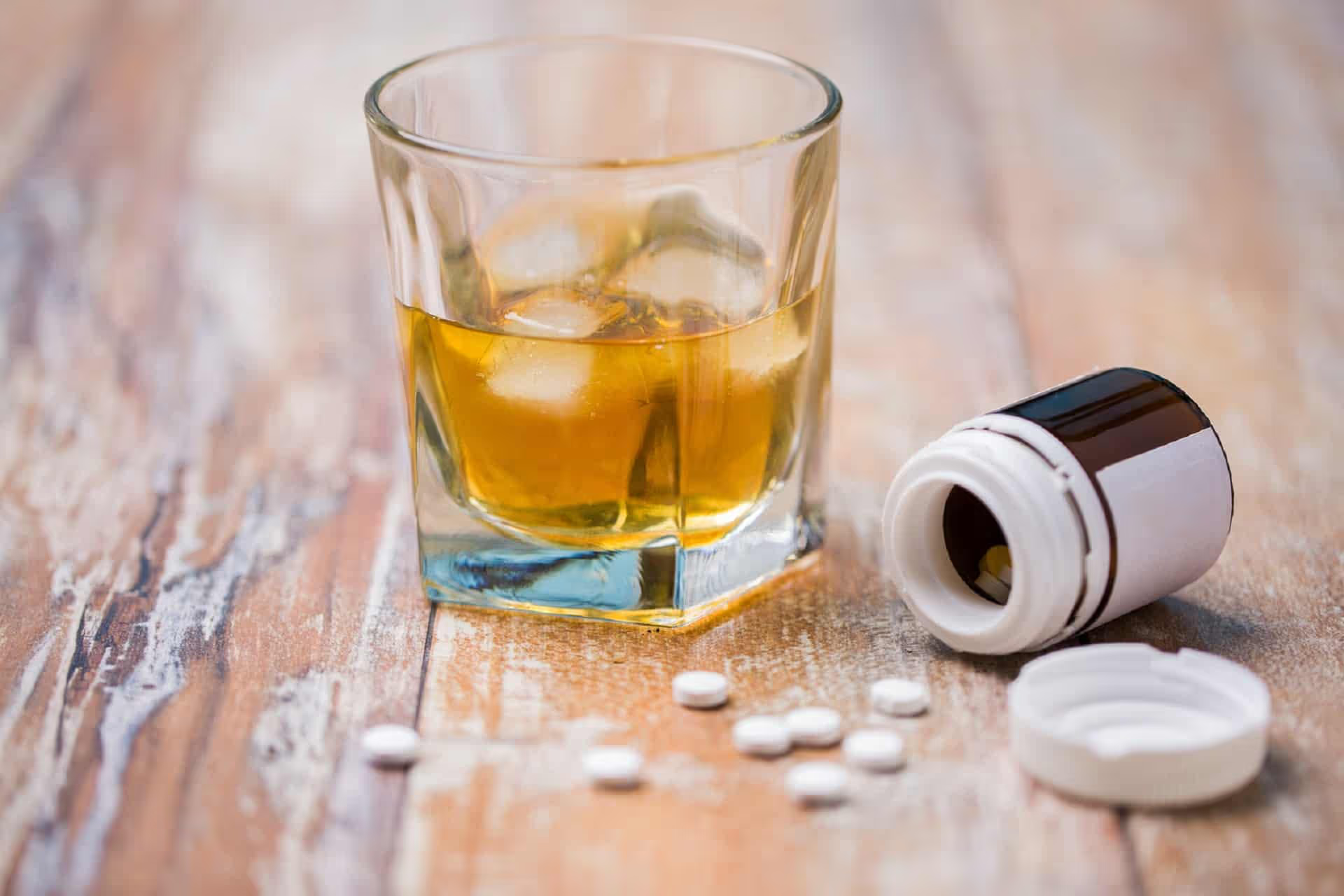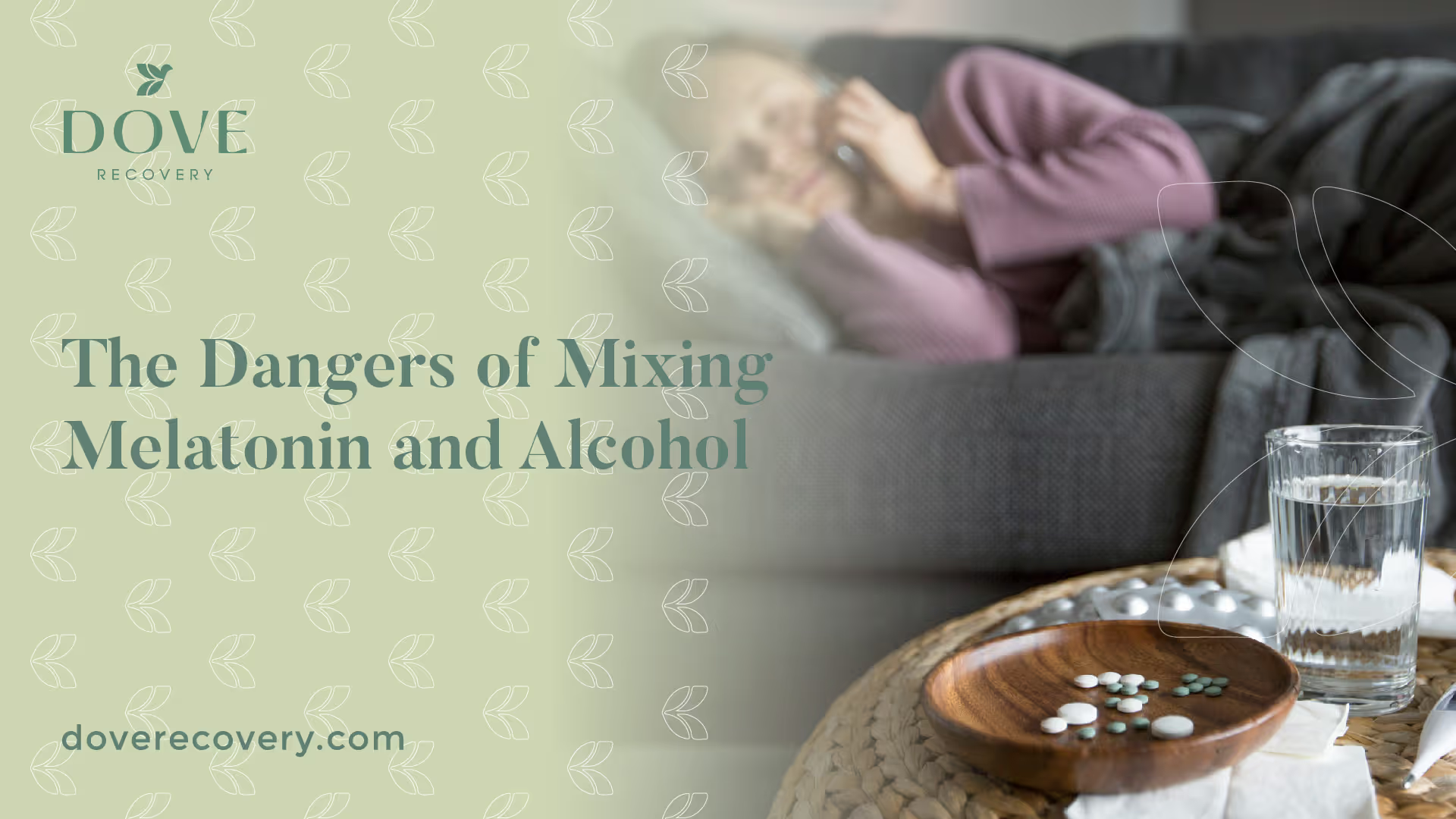The Dangers of Mixing Melatonin and Alcohol


Many people turn to alcohol to help them relax and sleep better at night. Others take melatonin supplements to help regulate their sleep-wake cycles. But what happens when you combine the two? In this article, we'll take a closer look at melatonin and alcohol, how they work in the body, and what you need to know before mixing the two.
What is Melatonin?
Melatonin is a hormone produced by the pineal gland in the brain. It's responsible for regulating the body's sleep-wake cycle, or circadian rhythm. Melatonin levels naturally rise in the evening, signaling to the body that it's time to sleep. Melatonin supplements are often used to treat sleep disorders and jet lag, as well as to promote relaxation and reduce anxiety.
How Does Alcohol Affect Sleep?
Alcohol is a sedative that can make you feel drowsy and relaxed. It can also help you fall asleep faster. However, while alcohol may help you fall asleep, it can disrupt the quality of your sleep. Alcohol has been shown to reduce rapid eye movement (REM) sleep, which is the stage of sleep where we process emotions and consolidate memories. It can also increase the number of awakenings during the night, leading to a less restful night's sleep overall.
How Does Melatonin Affect Sleep?
Melatonin supplements have become increasingly popular in recent years as a natural remedy for sleep disorders. Melatonin is a hormone produced by the pineal gland in the brain that helps regulate the sleep-wake cycle. By taking a melatonin supplement, you can increase the amount of this hormone in your body, which can make it easier to fall asleep and wake up at the desired times.
Studies have shown that melatonin can be effective in treating sleep disorders such as insomnia and delayed sleep phase syndrome. Insomnia is a common condition that affects millions of people worldwide and can have a significant impact on their quality of life. Delayed sleep phase syndrome is a disorder that causes individuals to have difficulty falling asleep and waking up at the desired times, which can lead to daytime sleepiness and other negative health consequences.
While melatonin is generally safe for most people to use, it is still important to talk to your doctor before starting any new supplements or medications. They can help you determine the right dosage for your needs and ensure that there are no potential interactions with other medications you may be taking.
What Happens When You Mix Melatonin and Alcohol?
While alcohol may seem like a helpful sleep aid, it can actually lead to poor sleep quality.
Here are some reasons why:
- Alcohol disrupts the natural stages of sleep, leading to less restorative deep sleep and more disrupted REM sleep.
- The effects of alcohol on sleep can be intensified when combined with melatonin supplements. For instance, mixing alcohol with melatonin can lead to side effects such as dizziness, headaches, or nausea.
- Melatonin can also make you feel more drowsy, which increases the risk of experiencing alcohol-induced blackouts or other dangerous side effects. For example, consuming alcohol after taking melatonin can result in impaired judgment and coordination, leading to falls or other accidents.
Therefore, while alcohol may seem like an easy way to fall asleep quickly, it's important to remember that the negative effects on sleep quality and the potential risks outweigh any perceived benefits.
The Potential Risks of Mixing Melatonin and Alcohol
Combining melatonin supplements with alcohol can have serious consequences. Here is a list of potential risks:
- Increased drowsiness and fatigue, which can lead to unsafe situations such as falling asleep while driving or operating heavy machinery.
- Impaired judgment and coordination, which can result in engaging in risky behaviors such as drinking and driving, or having unsafe sex.
- Digestive issues such as nausea, vomiting, or diarrhea, which can be exacerbated by the sedative effects of both substances.
- Long-term use of either melatonin or alcohol can have negative impacts on overall health. Combining the two could potentially worsen these effects or lead to new health concerns.
It's important to remember that while occasional use may not cause harm for everyone, it's best to talk to a doctor before combining any medications or supplements with alcohol. It's always important to prioritize your health and safety.
How Alcohol Affects Melatonin Production
Alcohol can also interfere with the body's natural production of melatonin. Studies have shown that alcohol consumption can reduce the amount of melatonin produced by the pineal gland, leading to disruptions in the sleep-wake cycle. This is because alcohol disrupts the normal functioning of the hypothalamus, a part of the brain that helps regulate many bodily functions, including the production and release of hormones like melatonin.
Furthermore, chronic alcohol use can lead to long-term changes in melatonin levels, causing sleep disturbances and other health problems. This is particularly true for heavy drinkers or those who struggle with alcohol addiction. It's important to note that these effects are not limited to just nighttime sleep; disruptions in melatonin production can also affect overall health and well-being, including immune function and mood regulation.
If you're struggling with sleep issues or considering taking melatonin supplements, it's best to talk to a healthcare professional first. They can help you determine if it's safe and appropriate for you based on your individual needs and medical history.
Recommended Dosage of Melatonin
While melatonin supplements are generally considered safe, it's important to take them in the right dosage. The recommended dosage of melatonin varies depending on the individual and the reason for taking it. For example, the recommended dose for treating insomnia may be different from the recommended dose for jet lag.
Taking too much melatonin can lead to side effects such as drowsiness, headaches, and nausea. It can also disrupt the natural production of melatonin in the body, leading to long-term sleep disturbances.
It's best to start with a low dose of melatonin (around 0.5-1mg) and gradually increase as needed. It's important to follow the instructions on the label or as directed by a healthcare professional.
It's also important to note that while melatonin supplements can be effective in promoting sleep, they should not be used as a long-term solution for chronic sleep issues. If you're experiencing ongoing sleep problems, it's best to talk to a healthcare professional who can help identify and address any underlying causes.
How to Stop Using Melatonin Supplements Safely
If you've been taking melatonin supplements regularly and want to stop, it's important to do so safely. Suddenly stopping melatonin can cause withdrawal symptoms such as insomnia, irritability, and fatigue.
Here are some tips for tapering off melatonin:
- Decrease your dosage gradually: Start by reducing your dosage by 0.5mg every few days until you're no longer taking the supplement.
- Use behavioral techniques: In addition to reducing your dosage, try using behavioral techniques such as practicing good sleep hygiene or relaxation exercises to help regulate your sleep-wake cycle.
- Talk to a healthcare professional: If you're having trouble tapering off melatonin or experiencing severe withdrawal symptoms, it's important to talk to a doctor or other healthcare professional who can help guide you through the process.
It's important to note that while melatonin supplements may be helpful in regulating the sleep-wake cycle in the short term, they should not be relied upon as a long-term solution for ongoing sleep issues. It's always best to address any underlying causes of sleep disturbances and work with a healthcare professional on developing a comprehensive treatment plan tailored to your individual needs.
Alternatives to Alcohol and Melatonin
While alcohol and melatonin are often used as sleep aids, there are other alternatives that can promote relaxation and improve sleep quality without the negative side effects.
Meditation
Meditation is a practice that involves training the mind to focus on the present moment. It has been shown to reduce stress and anxiety, improve mood, and enhance overall well-being. Regular meditation practice has also been found to promote better sleep quality by reducing racing thoughts and promoting relaxation.
Exercise
Regular exercise has numerous health benefits, including improved cardiovascular health, weight management, and reduced risk of chronic diseases such as diabetes and cancer. Exercise has also been shown to improve sleep quality by increasing the amount of time spent in deep sleep and reducing the number of awakenings during the night. However, it's important to avoid exercising too close to bedtime as this can have the opposite effect.
Herbal Remedies
Herbal remedies such as valerian root or chamomile tea have been used for centuries to promote relaxation and improve sleep quality. Valerian root has been found to be effective in treating insomnia, while chamomile tea has a calming effect on the body that can help reduce anxiety and promote restful sleep.
Cognitive Behavioral Therapy (CBT)
Cognitive Behavioral Therapy (CBT) is a type of talk therapy that focuses on changing negative thought patterns and behaviors. It has been found to be an effective treatment for insomnia by addressing underlying factors such as stress or anxiety that may be contributing to poor sleep quality.
In conclusion, while alcohol and melatonin may seem like easy solutions for improving sleep quality, there are many alternatives available that can promote relaxation without the negative side effects. By incorporating practices such as meditation or exercise into your daily routine or seeking out professional treatments like CBT or herbal remedies, you can achieve restful nights without compromising your health or safety.
Conclusion
While alcohol and melatonin are both commonly used to help regulate sleep, it's not recommended to mix the two. Alcohol can disrupt the quality of your sleep, and when combined with melatonin, the effects may be intensified. It's important to talk to your doctor before taking any supplements or medications, especially if you're also consuming alcohol.
Sources:
- National Institute on Alcohol Abuse and Alcoholism: https://www.niaaa.nih.gov/publications/brochures-and-fact-sheets/alcohols-effects-sleep
